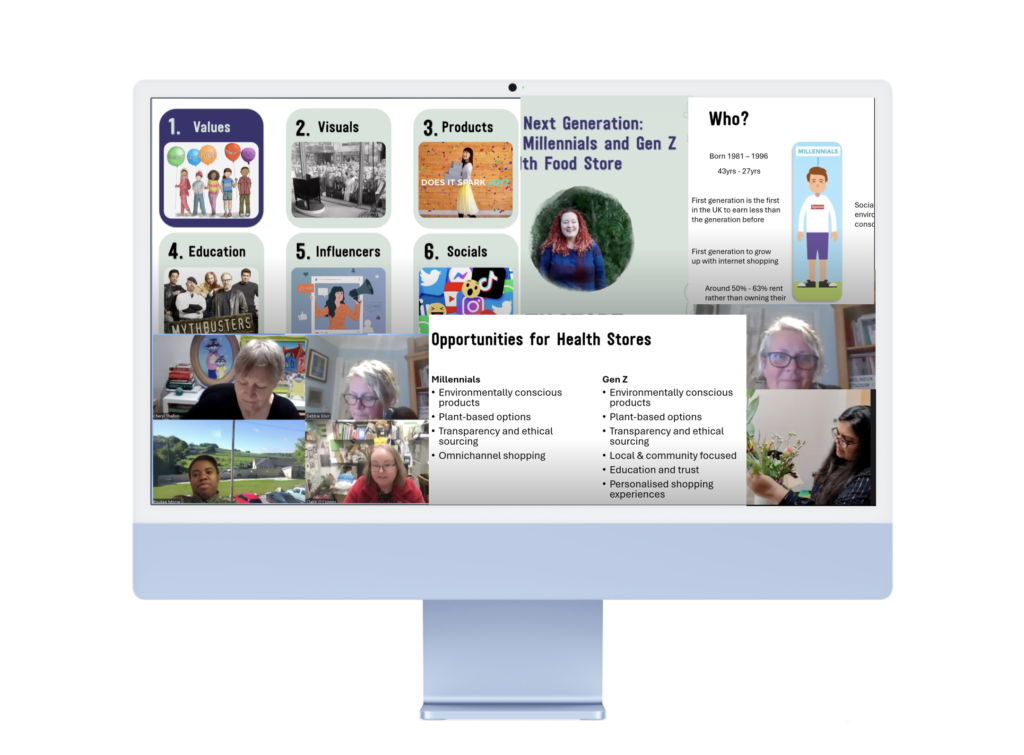Health stores are uniquely placed to help set Millennials and Gen Z on a journey of good health.
That’s the passionately held view of Holly Thallon Steenson, Viridian Nutrition MD and retailer (Sheaf Street Health Store, Daventry). Showing why that’s the case, and exploring practical ways of getting these vital younger demographics into our stores, was the subject of her recent Shop Talk presentation and discussion for Health Stores UK.

Holly, a Millennial herself, says she was inspired to look into the topic after asking the question ‘what kind of 60-year-old do I want to be?’.
“We know that people are living longer, but not necessarily in good or better health. In fact, your sixties are a prime time to have a heart attack, stroke or to develop heart failure. That’s a shocking fact for a someone in their twenties, say, to think about. But as health food retailers we can play a really valuable role educating people in their twenties and thirties about protecting and enhancing their health, so they don’t have to worry about some of these things in their sixties.”
Who are the Millennials and Gen Z
Starting with some scene setting, Holly said that Millennials are currently people aged between 24 and 43. Gen Z are defined as 12 to 26-year-olds. Collectively, they are responsible for 25% of total retail sales in the UK.
Millennials are price sensitive when they are shopping (as the first generation to be worse of than than their parents). It means they are more likely to be shopping with purpose and looking for a reason when they are buy a product.
Both Gen Z and Millennials have grown up with the internet, they display a lot more awareness of mental health issues, and they don’t just buy a product, they buy a story.
Both demographics have grown up with the internet. They have a preference for platforms like YouTube, Instagram, Snapchat and TikTok. These are all predominantly focused on visually driven and short form content. These shoppers live in a quick-fire world.
What are they thinking about?
Millennials and Gen Z share similar ideas and values – with some interesting differences. Both groups are looking for environmentally conscious products, plant-based options, transparency and ethical sourcing. Millennials are more likely to be ominchannel shoppers. Gen Z are additionally looking for education and trust and a personalised shopping experience.
Interestingly, Gen Z have an “old school” preference for shopping in a physical store, and are more likely to do so than Millennials. That, said Holly, is “really encouraging, because it suggests we may see a resurgence of the High Street coming along”.
When Millennials do choose to shop in physical stores the three main reasons they give for doing that are to support local, personalised customer service, and unique products.
Future proof your store with this six-point strategy
Holly suggests following this six-point strategy to help your store engage with the valuable Millennial and Gen Z demographics and convert them in to health store regulars.
Values – What does your store stand for, what is its mission? Is it about the place/location? Is it about the people? What is the purpose of the store? When you are clear about this, decide how you are going to voice those values – in-store, in your community and on social media.
Visuals – Remember that your window is a prime opportunity to tell the story of your values. But don’t overload your window with messages, or overwhelm your customers. Interactive and digital tools such as Google 360 which give people the opportunity to have a look around your store can be helpful for those who might be a little little bit nervous about entering a health store (reminder: 95% of shoppers don’t). Enable your customers to make connections. So if you are promoting a particular product or product category in the window, think about following through with some sampling or in-store display.
Products – Ask yourself about each of the products you have in store. Does it spark joy? Do you believe in it? What is the purpose it serves? Does it fit within your values?
Education – A really important area, and one where health stores always stand apart from their High Street and supermarket competitors. Offering person-to-person advice reinforces our difference. We can be high street myth busters, correcting unsubstantiated claims being made online and offering tailored advice with real-world knowledge and experience behind it.
Influencers – The opportunity here is to engage with local influencers, not celebrities. It may be a local mum doing a fundraising marathon. Or it could be a member of your own health-forward team. Be your own local influencers! Think also about working with other retailers in your area.
Socials – When engaging with Millennials and Gen Z, one of the key areas to think about is interactive marketing – polls, quizzes, surveys, online challenges. Nice looking content and imagery is good, but always try to loop it back to whatever call to action you are aiming for. That way you will engage with people in a more meaningful way.
A closing thought …
Holly left us with this closing thought: “Millennials and Gen Z are disillusioned – sometimes angry – with what they have inherited from previous generations. But I think, happily and significantly for health stores, the resurgence of ‘purposeful consumerism’ and nostalgia plays to the core values of health food stores and why they were formed in the first place. Young people feel a need for trust and authenticity as the demand for sustainability continues to strengthen. We can offer it to them.”
Health Stores UK members can watch the full recording on demand. Please visit www.healthstores.uk and go to the Members Area/Videos
